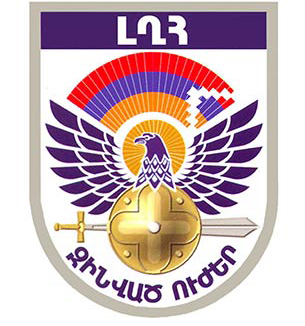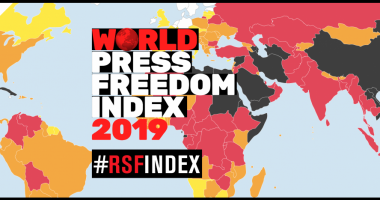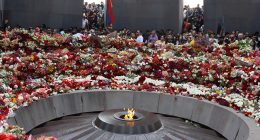By Hambersom Aghbashian
Vedat Türkali (born May 13, 1919, in Samsun – passed away August 29, 2016, in Yalova), is a Turkish writer, poet and novelist. After studying at Samsun High School he continued his study at Istanbul University, Faculty of Arts and graduated from Turkish Language and Literature Department, then worked as a literature teacher. He was arrested in 1951 for his political activities; and was sentenced to 9 years imprisonment, which was changed to 7 years and after some time he was released conditionally. Vedat Türkali has a long list of published works. Some of his major works are, One Day Alone – (novel, 1974 ), Old Poems, New Songs – (poems, 1979 ), Dark Blue – (novel, 1983 ), Old Movies – (Scenarios, 1984 ), Single Death – (novel, 1989 ), Confidence – (novel, 1999 ), Communist memory – (2001 ), Lost Roma – (novel, 2004 ), False Witnesses Coffee – (novel, 2009 ), Done Done Not done – (novel, 2014 ) and others. He was awarded Antalya Golden Orange Film Festival, Best Screenplay Award, 1965, TRT Games Award (Department Must Be Green), 1970, Nationalities Publishing Novel Competition First Prize, 1974 , Orhan Kemal Novel Award, 1976, the Cinema Writers Association (SIYAD) Honor Award, 2009, and the White Seagull Arts Honor Award, 2016. His “One Day Alone” became one of the greatest works of Turkish literature.
According to Today’s Zaman, September 26, 2014, a group of Turkish scholars, artists, and writers harshly condemned primary and middle school textbooks that are replete with anti-Armenian rhetoric in Turkey, and demanded that the books be pulled from circulation. In a statement issued in September (2014), the signatories wrote, “After immediately pulling the ‘History’ and ‘History of the Turkish Revolution’ textbooks from circulation, apologies should be issued to all students, particularly to Armenian ones. As we approach 2015, the road to Turkish-Armenian peace that we long for passes through here.” The textbooks portray Armenians as traitors who plotted with foreign enemies to tear apart the Ottoman Empire and Turkey, and as mass murderers of innocent Turkish and Muslim women and children while Muslim men were waging a war of survival. The textbooks, all published over the past few years and approved by a special commission of Turkey’s Ministry of Education, are also mandatory in Armenian schools in Turkey. The cover page of Unit 2 of the Middle School textbook on the history of the Turkish Revolution and Ataturk. Two newspapers in Turkey, Agos and Taraf, had published a series of articles by Taner Akçam on the anti-Armenian hate-filled rhetoric in Turkish textbooks earlier in September. Vedat Türkali, Yasemin was one of the Turkish intellectuals who signed the statement. The signees said textbooks in schools should seek to encourage feelings of peace, solidarity and living together over inciting hatred towards different religious and cultural groups. Vedat Türkali was is one of the prominent Turkish intellectuals who signed it.(1)
The Armenian Cause and the 1915 Genocide have been comprehensively covered for the first time ever in Turkey in a new novel written by Vedat Türkali. The author has written about various ethnic minorities in other literary pieces. The new novel presents a retrospective look into history against the background of the love story of a self-confident young lady and a young man who lost the sense of confidence in the aftermath of a trauma suffered in a prison in Diyarbekir (Dikranagert).
The author’s brief overview of the Armenian history is accompanied by a depiction of the other nations killed in Turkey (where he says every inch of land had seen bloodshed) in the Ottoman Empire’s last days. Türkali writes about the various groups like the Hamidiyes (cavalry), the Ittihat ve Terakki (Committee of Unions and Progress), Cembalists, and others. He tells the history of the 1909 Cilicia massacres (committed by Ittihat ve Terakki) which preceded the Armenian Genocide. The author also writes about the deportations from the province of Kharberd and the other regions of historical Armenia. He remembers how the soil turned into a vast graveyard, witnessing losses, forced conversion of people to Islam, and more.(2)
Vedat Türkali, who is considered one of the greats in modern Turkish literature, (died at the age of 97), was one of the few Turkish writers who had extensively reflected on Armenian Genocide, especially in his scandal-causing novel entitled “BİTTİ BİTTİ BİTMEDİ”, It’s Over, It’s Over, [But] It’s not Over. (3)
1-http://www.todayszaman.com/national_group-of-intellectuals-condemn-anti-armenian-statements-in-textbooks_359935.html
2- http://asbarez.com/128957/armenian-genocide-novel-published-in-turkey/
3- http://news.am/eng/news/343722.html










